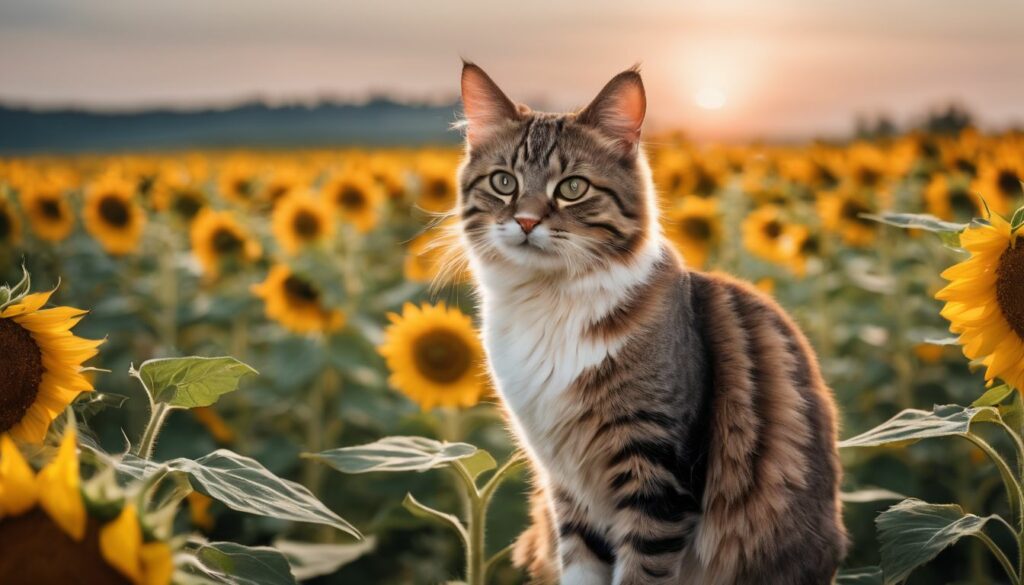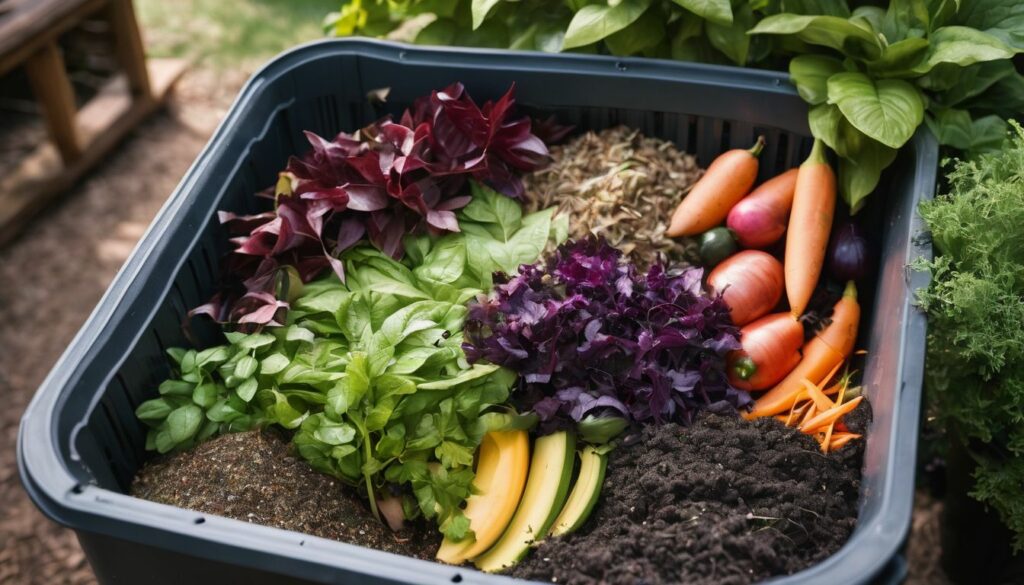Have you ever caught your feline companion giving those radiant sunflowers in your garden a little too much attention? It’s natural to be concerned about their safety. After all, they’re not just pets; they’re part of the family, right? According to the ASPCA, sunflowers are non-toxic to cats.
But it got me wondering — what happens beyond that point? What about ingesting petals and leaves, or even showing curiosity towards the seeds? This comprehensive guide aims to shed some light on these questions! Join us as we explore our furry friends’ fascination with these summery blooms in detail.
Let’s embark on this enlightening pet-care journey together – bright blooms and vibrant kitties await!
Key Takeaways
- Sunflowers are non – toxic to cats, but it’s important to monitor their consumption of sunflower seeds as they can upset their stomachs and pose a choking hazard.
- Cats can safely eat small amounts of sunflowers, but overeating can lead to digestive issues like vomiting and diarrhea.
- Sunflower oil is not toxic to cats, but large amounts can cause stomach upset, so clean them off if they come into contact with it.
- If you’re looking for cat – friendly alternatives to sunflowers, consider African violets, orchids, roses, tulips, and lilies (except for lilies which are highly toxic).
Understanding Sunflowers
Sunflowers are vibrant and iconic flowers that are known for their large yellow petals and tall stalks. They can grow up to 10 feet or more in height and produce seeds that are often enjoyed as a snack.
What are Sunflowers?
Sunflowers are big, bright flowers. They grow tall and strong in the sun. Their heads look like the sun with a golden-yellow circle and dark middle. You can see many of them in fields during the summer months.
Inside their dark middle, they have small seeds that birds love to eat. Many people like to grow them for fun or use their seeds to make oil or bird food.
Growing Sunflowers
I love growing sunflowers in my garden! They are easy to grow and add a bright pop of color. To start growing sunflowers, all you need is some soil, sunlight, and water. Plant the seeds in a sunny spot about 1-2 inches deep and water them regularly.
Sunflowers can grow quite tall, so make sure to give them enough space to thrive. As they grow, you may need to provide some support by staking or tying them up. In about 70-100 days, your sunflowers will bloom and bring joy to your garden.
Remember to harvest the seeds once the flower heads have dried out for delicious snacks or bird feed!
Harvesting Sunflower Seeds
To harvest sunflower seeds, you can wait until the flower head turns brown and the back of the flower becomes dry. Then, cut off the flower head and place it in a paper bag or hang it upside down to dry further.
Once completely dry, gently rub or shake the seeds out of the head and remove any remaining plant material. You can then store your harvested sunflower seeds in an airtight container for later use.
Just make sure to keep them away from your curious cat!
Sunflowers and Cats
Are Sunflowers Toxic to Cats?
Are Sunflowers Toxic to Cats?
Sunflowers are not toxic to cats. They are considered safe for our feline friends. According to the ASPCA, sunflowers are non-toxic to cats. However, it’s important to note that eating large quantities of sunflowers can cause an upset stomach in cats.
Additionally, the seeds of sunflowers can be a choking hazard if cats nibble on them. So while sunflowers themselves are safe for cats, caution should be taken with the seeds and their consumption should be monitored closely.
Can Cats Eat Sunflowers?
Sunflowers are not toxic to cats, so it’s generally safe for them to eat small amounts. However, eating too much can upset their stomach and cause vomiting. It’s important to monitor your cat if they have access to sunflowers, especially the seeds, as they can be a choking hazard.
The ASPCA confirms that sunflowers are non-toxic to cats, but it’s always best to exercise caution and prevent overconsumption. Remember, while sunflowers themselves are safe for cats, other flowers like lilies should be avoided as they are highly toxic.
Sunflowers vs. Sunflower Seeds
Sunflowers are not toxic to cats, but it’s important to be cautious when it comes to the seeds. While sunflower petals and leaves are safe for cats, eating a large quantity of sunflower seeds can cause digestive issues.
Additionally, the shells of the seeds can be sharp and pose a choking hazard if your cat nibbles on them. It’s best to monitor your cat if they have access to sunflowers and make sure they don’t consume too many seeds.
Sunflower Oil and Cats
Sunflower oil is made from the seeds of sunflowers and is commonly used in cooking. When it comes to cats, there is no evidence to suggest that sunflower oil is toxic or harmful. However, it’s important to note that cats have sensitive digestive systems, and consuming large amounts of any type of oil can lead to stomach upset or diarrhea.
If you accidentally spill sunflower oil near your cat or they come into contact with it, make sure to clean them off thoroughly as ingesting a significant amount could cause discomfort.
As always, if you’re ever concerned about your cat’s health after exposure to sunflower oil or any other substance, consult your veterinarian for guidance.
Cat-Friendly Alternatives to Sunflowers
If you’re looking for cat-friendly alternatives to sunflowers, consider African violets, orchids, roses, tulips, and lilies.
African Violets
African Violets are a popular choice for cat owners as they are non-toxic to cats. These beautiful flowers add a vibrant touch to any home, and you don’t have to worry about your feline friend getting sick if they decide to take a nibble.
African Violets are safe for cats to be around, making them an excellent alternative if you want to brighten up your space without compromising your pet’s health. Just be sure not to overwater the plants or let your cat play with the soil, as damp conditions can lead to mold growth which may cause respiratory issues for both humans and pets.
Orchids
Orchids are another cat-friendly alternative to sunflowers. These elegant flowers come in a variety of colors and shapes, making them a beautiful addition to any home. Unlike sunflowers, orchids are non-toxic to cats, so you won’t have to worry about your feline friend getting sick if they decide to take a nibble.
Just like with any plant, though, it’s always important to supervise your cat around orchids and make sure they don’t knock them over or chew on the leaves or stems. With proper care, orchids can be a safe and lovely choice for adding some natural beauty indoors without posing a risk to your cat’s health.
Roses
Roses are a popular flower that many people love to have in their homes and gardens. The good news is that roses are non-toxic to cats, which means they won’t harm your feline friend if they come into contact with them.
In fact, roses are considered cat-friendly flowers, along with tulips, gerberas, carnations, snapdragons, and daffodils. So if you’re looking for some beautiful flowers to brighten up your home and keep your kitty safe at the same time, consider adding some lovely roses to your collection.
Just remember to be cautious with any thorns on the stems to prevent accidental injuries!
Tulips
Tulips are another cat-friendly flower that you can have in your home without worrying about their safety. They are non-toxic to cats, which means that even if your feline friend decides to take a nibble out of a tulip petal, it won’t harm them.
Tulips come in various colors and can add a vibrant touch to any room. Just make sure to keep an eye on your cat around the flowers, as they may knock them over or play with them.
Lilies
Lilies are actually one of the most toxic flowers for cats. It is crucial to keep lilies away from your feline friends as even a small ingestion can be extremely harmful, potentially leading to kidney failure or death.
Whether it’s the petals, stem, leaves, pollen, or even the water in a vase that has had lilies in it, all parts of the plant can cause serious harm to cats. Therefore, it’s best to avoid having lilies in your home if you have cats and opt for other cat-friendly flowers instead.
Potential Dangers of Sunflowers for Cats
There are a few potential dangers associated with sunflowers and cats, including minor stomach upset, allergic reactions, and the possibility of sharp sunflower shells causing harm.
Minor Stomach Upset
Eating sunflowers can sometimes cause a minor stomach upset in cats. Although sunflowers are non-toxic to cats, consuming large amounts of them may lead to digestive issues like vomiting or diarrhea.
It’s important to monitor your cat if they have access to sunflowers and ensure they don’t eat a significant amount. If you notice any signs of discomfort or illness, it’s best to consult with your veterinarian for proper guidance and care.
Remember, moderation is key when it comes to introducing new foods or plants into your cat’s diet.
Allergic Reactions
Some cats may have allergic reactions to sunflowers. These reactions can include skin irritations, itching, sneezing, and watery eyes. It’s important to monitor your cat closely if they come into contact with sunflowers or are exposed to their pollen.
If you notice any signs of an allergic reaction, it’s best to remove your cat from the area and consult with a veterinarian for further guidance.
Sharp Sunflower Shells
Sunflower shells can pose a potential danger to cats. The sharp edges of the shells can cause cuts or injuries if a cat chews on them or accidentally swallows them. It’s important to keep an eye on your cat if they have access to sunflowers and make sure they don’t eat the shells.
If you notice any signs of discomfort or unusual behavior, it’s best to consult with a veterinarian right away.
Conclusion
In conclusion, sunflowers are generally safe for cats. They are not toxic to feline friends, but it’s best to prevent them from overeating sunflower seeds or nibbling on the sharp shells.
If you have concerns about your cat’s health or if they exhibit any unusual symptoms after being around sunflowers, it’s always a good idea to consult with your veterinarian.
FAQs
1. Are sunflowers toxic to cats?
No, sunflowers are not harmful to cats, but they can have health issues if they eat the sharp shell of the kernels.
2. Can cats eat sunflower seeds?
Cats should avoid eating sunflower seeds because the kernels and sharp shells may cause them harm.
3. Is it safe for a cat to chew on a sunflower stalk or leaves?
Yes, it’s safe for them. Sunflower plants are nontoxic to animals including their stalks and leaves.
4. Can my cat get sick from eating sunflower petals?
While not poisonous, some cats may show signs of being unwell after eating sunflower petals due to allergies.
5. Which other flowers are safe for my cat besides Sunflowers?
Daisies and roses are also friendly plants for your feline friend apart from Sunflowers as long as no part of these is eaten in large amounts.





